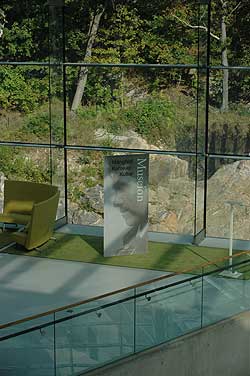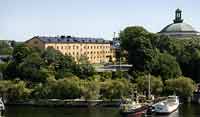SWEDISH SOUTH ASIAN STUDIES NETWORK

Museion, Göteborg University:
Postal address: Box 111, SE 405 30 Göteborg
Visiting adress: Södra vägen 54
Fax: +46 (0)31 - 786 5800
Web page: http://www.museion.gu.se
Contact person: Anna Nilsson, phone +46 (0)31 786 5875
Museion is a Göteborg University program, co-operating with several University departments and the new Museum of World Culture (Världskulturmuseet). It was started with the view to integrate research with education and public presentations. It has a global and interdisciplinary focus. Since 8 August 2005 Museion is located within the premises of the new built Museum of World Culture, with which Museion is closely connected.
Masters programme and undergraduate courses
In close collaboration with the Museum of World Culture Museion runs a two year (80 credit points) Masters programme in International Museum Studies. Of the thirty study places in the programme, fifteen are reserved for students from abroad. This international education is aimed at students from all over the world who wish to pursue a career in the museum sector. The programme is a post-graduate training of 8O credit units (two academic years), which combines theory and practice through taught courses, qualified work experience in the museum sector and the writing of a Master´s dissertation. The students are required to have (or to obtain) a Bachelors Degree and are admitted to the programme as a whole. After successful completion students are awarded a Master’s Degree in International Museum Studies. The programme runs every other year. A new course started in the Fall 2008. More information on the Master’s programme.
Museion also offers under graduate courses on subjects that aims to reflect the circumstances that people live under in the globalized world of today. These courses, all taught in Swedish, are collected under three overarching themes, namely • Globalization; • Power and Marginalization; and • Knowledge and Communication. Several of these courses partly deal with South Asian issues, for example:
Under the theme ”Power and Marginalisation” (Makt
och marginalisering), Museion ran a number of courses during the
Spring 2008. Contact
Person: Dr. Stellan
Vinthagen, from the Dept.
of Peace and Development Studies (PADRIGU), School of Global Studies,
Göteborg University.
‡ A 15 credits course on Social
and Legal Movements (Sociala och rättsliga rörelser).
‡ A 15 credits course on Power,
Resistance and Change 1 (Makt,
motstånd och förändring
I). More
information about the course.
‡ A 15 credits course on Power,
Resistance and Change 2 (Makt, motstånd
och förändring
II). More
information about the course.
Under the theme ”Knowledge and Communication”, the following South Asia related courses were run during the Fall 2008. Last date for applications: Friday 18 April 2008.
‡ A 15 credits course China and India: Visualisations of Nations(Kina och Indien: visualiseringar av nationer). Contact person: Dr. Eva Rosén Hockersmit.
Under the theme ”Power and Marginalization”, the following South Asia related course was run during the Fall 2008. Last date for applications: Friday 18 April 2008.
‡ A 15 credits course on The Challenges of Buddhism: Power, Morality and Resistance in a Global Perspective (Buddhismens utmaningar: makt, moral och motstånd i ett globalt perspektiv). Contact person: Dr. Per Lundberg, School of Global Studies, Göteborg University. More information about the course.
Under the theme ”Globalisation”, the following South Asia related courses were run during the Fall 2008. Last date for applications: Friday 18 April 2008.
‡ A 15 credits course on Religion and Politics: Meetings in the Global Room (Religion och Politik: Möten i det globala rummet). Contact person: Jan Johansson from the Dept of Social Anthropology, School of Global Studies, Göteborg University. More information about the course.
‡ A 15 credits course on The Global City (Den globala staden). Contact person: Dr. Marie Thynell from the Dept. of Peace and Development Studies (PADRIGU), School of Global Studies, Göteborg University. More information about the course.
‡ A 15 credits course on Global Gender Studies (Globala Genusstudier). Contact person: Dr. Gunilla Blomqvist from the Dept. of Peace and Development Studies (PADRIGU), School of Global Studies, Göteborg University. More information about the course.During the Spring 2009, Museion also offers another South Asia related course under the theme ”Power and Marginalisation”.
‡ A 15 credits course on Power, Resistance and Change 1 (Makt, motstånd och förändring I). Contact person: Dr. Stellan Vinthagen, from the Dept. of Peace and Development Studies (PADRIGU), School of Global Studies, Göteborg University. More information about the course.
In the Fall 2007, Museion at Göteborg University also arranged a 15 credits course titled Tales of Objects: between traditions and modernities in India and China (Föremålen berättar: mellan traditioner och moderniteter i Indien och Kina). The course aimed at providing tools for understanding visual culture and its role. The work material consisted of objects from the collections of the Museum of World Culture, combined with modern ethnographic material, through which aspects of ancient and contemporary Indian and Chinese culture and society was studied. The course was led by the Sinologist Marie Carlsson and Dr. Eva Rosén-Hockersmith from the Dept. of Religous Studies and Theology, Göteborg University.
Museion conducts research in close collaboratioin with the Museum of World Culture and its exhibitions. Anthologies have for example been published as part of the exhibitions ”Horizons – perspecitves on a global Africa” and ”No name fever – AIDS in the age of globalization”. In connection with an exhibition on trafficking, Museion researchers have studied trade with archeological objects as well as the debate on trafficking in Sweden. From autumn 2005 Peter Davis is a guest professor at Museion. He holds a professorship in museology at Newcastle University, UK, where he also was director of the School of Arts and Cultures until 2005. His main task at Museion will be to form a new research profile for the department.
The
archeologist Eva
Myrdal was connected to Museion until 2002. She has
been involved in research on South Asia, especially in Sri Lanka, for
many years. The research includes a project called ”Comparative
studies of production processes in certain marginal areas in South Asia
and North Europe”, where she compared research data on the use
and control of forest resources in the Swedish province of Värmland,
and the dry areas of Sri Lanka. The project has included research collaboration
with the Postgraduate
Institute of Archaeology at Kelaniya University in Sri Lanka.
On the Research Conference ”Structures of Vulnerability” held at Stockholm University 12–14 January 2005 Eva Myrdal chaired a panel on ”Cultural Heritage and Sustainability in long-term Perspective”, where she also presented her own research paper on ”The Archaeology of Colonial Warfare. Changing Land-use Patterns in Sri Lanka in its 19th century”.
In 2001 Myrdal along with Jan af
Geijerstam, Dept of History of Science
and Technology, Royal Institute of Technology, Stockholm, was given
a planning grant by SASNET for a project
called ”Exploring the state of art
of studies of the South Asian societal/nature interface through time”.
The suggestion involved networking in order to arrange a symposium
with the view of bridging the gap between the humanities, the social
sciences, the natural sciences and technology. It was first presented
by Myrdal and af Geijerstam at the SASNET virtual conference in December
2000. Read
the suggestion.
The project involved networking in order to arrange a symposium with
the view of bridging the gap between the humanities, the social sciences,
the natural sciences and technology. The presentations would be supposed
to include studies of ”high tech” history as well as of regional
traditional rural or tribal techniques of everyday life and modern studies
of technology transfer and appropriate technology. Eva Myrdal was responsible
for the Swedish and Sri Lankan contacts, and she arranged a networking
meeting in Göteborg on 19 April 2002. Contacts were established
with educational and research institutions in Sweden, India and Sri Lanka,
representing the humanities, social sciences, the applied natural sciences
and public institutions responsible for dissemination to the general
public (museums).
 Since
2003 Eva Myrdal is Head of Unit Research and Development at the s at Skeppsholmen in Stockholm. This is
the museum in Sweden which has the main responsibility of presenting
Asia to the Swedish public (apart from the Near East). It manages archaeological
collections from China, South-East, Central and South Asia. Apart from
this one major focus of the collection is on Buddhist East and South
East Asia but it also contains Buddhist and Hindu sculptures and bronzes
from India, as well as a small collection of Mughal paintings.
Since
2003 Eva Myrdal is Head of Unit Research and Development at the s at Skeppsholmen in Stockholm. This is
the museum in Sweden which has the main responsibility of presenting
Asia to the Swedish public (apart from the Near East). It manages archaeological
collections from China, South-East, Central and South Asia. Apart from
this one major focus of the collection is on Buddhist East and South
East Asia but it also contains Buddhist and Hindu sculptures and bronzes
from India, as well as a small collection of Mughal paintings.
Eva Myrdal and the museum director Magnus
Fiskesjö have been engaged in making a collection of
1 500 years old artefacts from the settlement site Rang Mahal in Rajasthan,
India, available to the public. The artefacts were found by an Indo-Swedish
archeological team headed by Hanna Rydh in the 1950’s, but has
so far not been exposed. In October 2003 Myrdal and Fiskesjö published
an article on this in SYDASIEN 3/03. Go for the article ”Impressive
finds from ancient rice farmers” (in Swedish only).
SASNET - Swedish South Asian Studies Network/Lund
University
Address: Scheelevägen 15 D, SE-223 70 Lund, Sweden
Phone: +46 46 222 73 40
Webmaster: Lars Eklund
Last updated
2009-04-03

